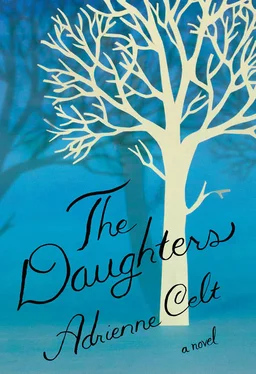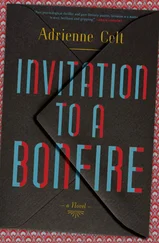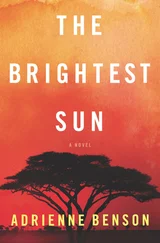The pounding of the water on the earth was a drum, and Greta paced its rhythm towards the forest. She didn’t seem to mind that she was alone. The cottage Saul had built for them was at the edge of town, and that was where she knew she’d find him. People peered out their windows and watched her go by: a speck of light, a candle flicker in the gloom. The vision of her drew them like the scent of fresh fruit. They followed her hungrily from pane to pane.
For despite its obscuring of everything else, the rain revealed Greta. The cotton of her gown became translucent and sticky, luminous against her flesh. The townspeople could see the curve of her shoulder blades, feel their fingers aching to run keystrokes down her spine. They wanted to pinch her thighs, bite her thumbs, suck the water off her hair. They wanted to blow warm air against her belly and unbutton her clothes, feeling the pop of each release. Greta shook her head and shot silver spray in all directions, a halo of movement and mercury. People everywhere opened their doors and walked out into the storm, carrying flowers.
At the border of the woods and the road, Greta paused, halting the crowd that had formed behind her. Everyone was soaked, and solemn. Beyond Greta was nothing but the same gray water, hanging like a curtain that roared and reared. But then there came a light.
It seemed to those looking that Saul had opened a door in the very rain. Behind him glowed the warmth of golden wood, the scent of a cookstove. He stood, perfectly dry, in the doorway and looked out at his bride: a living wave. She bade him come forward and he did, the rain plastering his hair against his head and turning his clothes as dark as pitch. Standing in the space where civilization melted into the trees, he wrapped his arms around Greta and kissed her until she almost wasn’t there. The crowd’s ears were full of the howl of the storm, their stomachs gnawing with joy and envy. Greta pulled away and placed her thumb on the bruise of Saul’s bottom lip. I choose you , her eyes said. You only. And if it was a half-truth, still hungry for the child lost at the dance, it didn’t seem so at the time.
Saul picked Greta up in the driving rain and ascended the unseen steps to their home: just a rectangle of warmth in the storm, an outpost on the edge of the forest. When he closed the door, no one could see where the couple had gone, and they could only throw their flowers to the ground in the hope they’d be found when the sun reemerged.
All day I’ve been walking into things. My toe slammed so hard into the leg of a chair that I had to set Kara down and grab on to it — I was sure the nail had split, but it did no more than blush purple. I knocked another bruise onto my arm just walking through a doorway, and scraped my tailbone against the corner of a dresser drawer while picking out clothes after the shower. That one bled, red blooming through the flakes of skin as I bit my lip and contorted my spine to get a look. I can never resist inspecting an injury, although until recently I almost never had any to look at. Perhaps wounds have gravity, and draw their own kind. Like the sun draws the Earth, and the Earth draws the moon.
What would Baba Ada think of my sense of presentation today? I laugh even to imagine it, which hurts just a little below my navel. Yes, I put on makeup and blew my hair dry, but my face is only a veneer. I have no control over my body at large, the instrument I’ve spent my whole life honing. Did Ada know that giving birth would be so disastrous? She must have guessed, must have had some sense of it — after all, she herself was Greta’s only daughter, come after three sons and a number of miscarriages.
Proximity between birth and death runs in every family, but it seems to run especially close in ours. Ada didn’t like to tell the dark side of a story though. As far as presentation goes, that was her method, her modus. Still, I wish she were here now. I could tell her things that would make her hair curl, and she would listen. I could ask her what comes next, how scared I need to be that these little cuts and bruises aren’t the end of my troubles.
Old habits: I half look for her, my baba, perched on a chair or leaning against the door. But there’s only Kara, lying on a blanket on the bedroom floor. Burbling as she moves her head — it would be wrong to say she turns it, but it bobs a little, gives a healthy jerk. Her limbs move too, spasmodically. This is what she’s been doing all day, either in my arms or laid out somewhere. I almost resent her calm unawareness, the blank canvas of her. She doesn’t know that my heart skips every time the phone rings from the other room, as if it were always John, calling to accuse me. Kara could still be convinced to become anything. Anyone’s. Whereas my life is scribbled over, a garbled language with no one left to understand it. I miss Ada. Ada, who knew me.
“Let’s go outside,” I say to Kara. “Hmm?” Making my voice soft.
I pick the baby up, and her back bends gracefully under the pressure of her own weight, muscles too foreign to themselves to support the bones. It’s exquisite, how close my attention adheres to the details of her body. One false move and I could snap something, tweak some tender part of her so it grows awry. Carefully I bundle her, trying to meditate on each piece of clothing. The soft knit cap into which I tuck Kara’s hair fits snugly down over her ears, so tight that it seems to promise a bit of extra skull for these days of early life, as well as a barrier against cold air.
Good thing, too. A gust of wind roars against the window, which audibly strains. The day is still stormy. A part of me knows we really shouldn’t go out in it at all, but then again, my phone is still ringing. I think about Greta and Saul, married in a rainstorm. I think about my own husband, turning up his collar this morning against the cold.
I think about myself, and when I can’t anymore, I think about my daughter.
Supposedly infants can’t see well. The world to them is made up of dim shapes and vague shadings of light. Not unlike a surgery patient wrapped up in gauze. Or a theater patron, once the house lights have gone down, who can half sense that places have been taken onstage but doesn’t know where, or who, or why. Is that how things are for you? I wonder to Kara. She seems to be watching closely enough, more so as she unwrinkles from her time in the womb and her eyes lose their perpetual sleepy squint. I touch her cheek and she immediately sniffles towards my finger. I snap on the other side of her head and she wobbles around trying to get a look.
Not so gauzy then. She is already a creature of sound and scent, full of anticipation and eagerness. She wants to hear. And if she hears enough, someday she’ll want to speak. To see. To know everything.
But not yet. For now, there’s still just one person I can whisper my secrets to, even if they don’t quite reach her. One person who can tell me if the face I’m showing to the world is the right one. I need that today, if I ever want to be strong enough to hear Kara’s secrets in turn. Otherwise I might keel over, a ship in a gale, no help in sight. I pull the cap more carefully around her ears and enclose her in a downy blanket the color of the sea. Out we go. We’re on our way.
To the only place I can think of worth going, right now. To the only person I’ve ever known who could always see light when faced with darkness.
Greta and Saul were early with their sons. First was Andrzej, towheaded at birth but later dark as dirt. Then Fil, who tagged after his brother and begged to play; Fil who was smattered with freckles and stomping with mischief. Finally came Konrad, blond as a bell ringing.
“My brothers,” Ada said, “were a tribe. Always together. They moved with one body, like a herd of deer. They sniffed in the grass, and they butted their heads together, pushed each other around in the yard. Sometimes they nibbled food from the vegetable patch. Just a bite here or there.” She slit her eyes at me, sidelong. “Like some other people I could mention.”
Читать дальше












